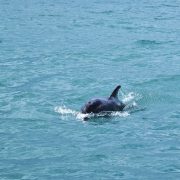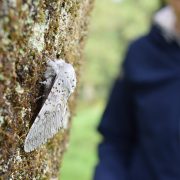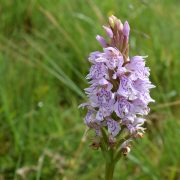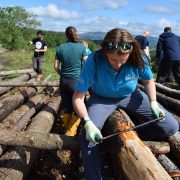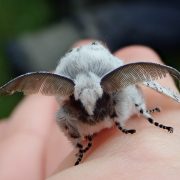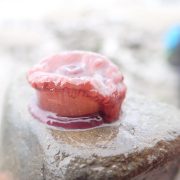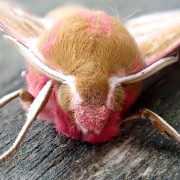Each year, a group of staff from a variety of departments across the zoo are sent into the field to get hands on with conservation work. This not only gives staff the opportunity to get involved in activities that they would never normally get the chance to, but it also provides the opportunity to carry out conservation work that wouldn’t be possible without the extra support.
This year’s expedition saw the largest expedition team yet head to a UK destination for the first time! 18 members of staff from various departments across the zoo, as well as 4 members of staff from RECORD (a Cheshire wildlife recording organisation based at the zoo), travelled to two locations in the Cardigan Bay area in Wales for two weeks of conservation fieldwork. The main objective of the trip was to assist our field partners with conservation action through wildlife recording and habitat management, and to engage the public of the necessity of conserving UK wildlife.
The team worked with some of our partners, including two of the Wildlife Trusts in Wales, Rewilding Britain and The Woodland Trust to carry out essential surveys of wildlife on the Welsh coast, as well as removing invasive plant species, constructing roundwood buildings for educational use, beach cleaning, and ecotourism walking route planning.
During week one, the team woke up early every day and made their way down to Llanrhystud beach, New Quay beach and Aberystwyth beach to participate in ocean wildlife surveys, shoresearches and beach cleaning. The surveys for cetaceans (marine mammals), were fantastically successful, with the whole team spotting bottlenose dolphins in New Quay during the total of 20 hours they spent surveying. One of the days they were spotted from a boat, which was a definite highlight for many of the team! The shoresearch surveys were also a huge success, with a total of 54 quadrants undertaken, discovering 13 types of seaweed, 8 molluscs, 7 crustaceans and 5 polychaete worms. Not only did the team conduct all these surveys during week one, they also spent a total of 52 hours beach cleaning, collecting 2,314 pieces of rubbish (including over 600 pieces of plastic and over 900 cigarette butts)! All the data collected has been fed into The Wildlife Trusts’ records which will help inform the management and creation of protected areas in the region.
Two members of staff from the Discovery and Learning team at the zoo joined the expedition to assist from a public engagement perspective. They worked incredibly hard to create a fantastic event on the Aberystwyth seafront for World Oceans Day. The whole expedition team got stuck in and engaged with around 950 people on the day. In celebration, the team ran a day of activities and public engagement alongside the Wildlife Trusts ranging from an interactive rockpool trough, to ocean themed craft activities, and stomach content matching. The activities, expert talks, face painting and even a parade aimed to inspire people to care about the amazing wildlife found around UK coasts. It was a fantastic end to the first week of the trip!
In week two the expedition group made their way up the coast to Machynlleth, where they spent the first day working with The Woodland Trust in an ancient woodland called Cefn Coch. The team were tasked with assisting with removing two invasive species which had been causing issues for the native species on this site; rhododendron and western hemlock trees. It was hard physical work, but the team manage to make great progress!
For the rest of the week, the team split into three sub-groups to thoroughly cover three areas; the teams were surveys, walking routes and building, all contributing to the “Summit to Seas” project. The survey group examined the biodiversity across three inland sites conducting moth trapping, bat transects, and small mammal trapping, as well as collecting data of other flora and fauna species they encountered on the way. Despite the heavy rain, the team managed to collect 65 records of 58 species!
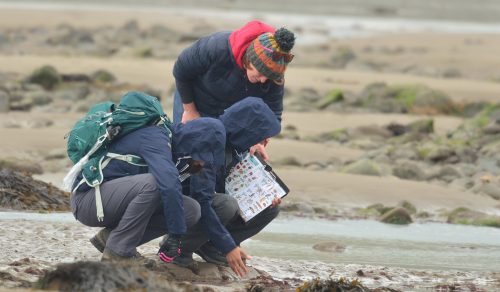
Another subgroup developed a walking route from the Cardigan Bay coast along a 50km route through some of the most scenic Welsh countryside and back to the coast. The main aim of this activity was to encourage visitors to reconnect with the areas of rich natural and cultural heritage, discovering beautiful landscapes and points of interest.
The third group spent the week working on building two traditional constructions with Cambrian Wildwood, to create an area that could be used for camping and education. One building was a composting toilet and the other an education building. Using traditional methods, the building group managed to build the majority of the composting toilet and make a fantastic start on the structure for the education building.
The partnerships built with the three organisations the team worked with during the expedition are invaluable to future UK conservation work we would like to get involved in, and the trip inspired staff and members of the public to take a proactive approach to protecting UK wildlife. The established survey methods are hoped to be repeated in future, with the potential for extensive Chester Zoo involvement!
What did our staff think of the expedition…?
“I think the thing I enjoyed the most about the Wales expedition was finding out how knowledgeable everyone was and how keen everyone was to share their knowledge with others. The team participation was great, with everyone mucking in and helping on every part of the survey work and on World Oceans Day. It was nice to talk to people about the work that we do at the zoo and how it’s just as important to care about our own endangered wildlife in the UK as it is to care for animals abroad.
“The fortnight was extremely enjoyable with some really nice people to work with that you wouldn`t usually see because they work in the offices. Sharing a room with 3 youngsters was fine as they were flaked out by the time we came back from the moth set ups late in the evenings! Everyone was quite mindful of everyone else, making each other cups of tea or putting the fire on when people came back from a survey cold and wet. In all a great experience :)”
Anne Morris, Lead Keeeper – parrots and penguins
“I’m an introvert, so spending two weeks with a load of people, some of whom I didn’t know, for two weeks solid caused a bit of pre-expedition anxiety. However, I must say everyone there was a pleasure to work with and spend time with and I made new friends. The Chester Zoo staff expedition is brilliant for skill sharing and peer-learning and I believe an expedition in the UK was perfect for this. I certainly learned a lot from my colleagues, sorry let me reword….friends. The Wales expedition WhatsApp group is evidence of this, which is still very active months after returning.”
Lindsay Eckley, Research Officer
“Going on the expedition provided a brilliant opportunity to get to know staff from across the zoo. We were lucky with the level of ‘luxury’ we experienced whilst on the Wales expedition compared to other field partners, which left lots of time for socialising and getting to know each other. The team had a vast amount of knowledge and experience in different areas and having all of this on hand whilst organising World Oceans Day really helped to make the event such a success!”
Iona Cowell, Wildlife Connections Project Officer
“During the expedition it was very humbling to see the high level of enthusiasm for UK wildlife across the team, everyone was keen to share their insect findings with me, even after a long day’s work. The expedition was a great opportunity for me to get know more staff across different zoo departments. I feel that more people will now be aware of who RECORD are, what we do and the importance of recording UK wildlife for conservation purposes.”
Leanna Dixon, RECORD
“I couldn’t imagine a better bunch of people to go on expedition with. Some of the team were very experienced and really inspired me with their incredible (and enviable) native species knowledge, while those that didn’t have much experience with native UK wildlife were contagious with their excitement and enthusiasm to learn more.
“Aside from that, we all had a lot of fun together and this definitely kept our spirits up, especially when it was raining! For me, the time when I really saw the team come together and support one another was when we all worked hard to make the World Oceans Day event the best it could be. There was a lot of preparation work, and people were more than happy to help and get stuck in.
“Now I am back at the zoo, it’s nice to have a new group of work friends, but also it’s helped me in my job as I have lots of contacts around the zoo in all sorts of different roles.”
Naiara Dunn, Safari Ranger
“I think spending a day hunting for and cutting down Rhododendron in an ancient forest has scarred me for life – I keep seeing them and my fingers keep itching for a saw.”
Natasha Murwill, Guest Experience Assistant
“I have to admit, that it was with some trepidation that I agreed to join the expedition team. I am a fairly quiet person and often happiest in my own company, perhaps even to the verge of being a hermit. So how was I going to cope with spending a full two weeks in the constant company of twenty other people, most of whom I didn’t know?! To my surprise, the experience was a genuinely pleasurable one; the whole team gelled amazingly well. The strong connection we had built, based around our shared passion for the natural world, in the end went deeper and resulted in valuable friendships being forged.”
Eric Fletcher, RECORD
NOW is the time to ACT FOR WILDLIFE. Conservation is CRITICAL; species are under threat. TOGETHER we can make a BIG difference. Take action TODAY and join us in PREVENTING EXTINCTION.
